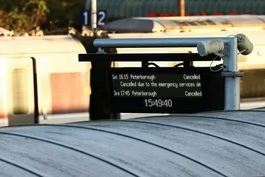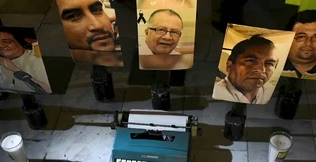
November 2, 2025 - PBS News Weekend full episode
11/2/2025 | 26m 45sVideo has Closed Captions
November 2, 2025 - PBS News Weekend full episode
November 2, 2025 - PBS News Weekend full episode
Problems playing video? | Closed Captioning Feedback
Problems playing video? | Closed Captioning Feedback
Major corporate funding for the PBS News Hour is provided by BDO, BNSF, Consumer Cellular, American Cruise Lines, and Raymond James. Funding for the PBS NewsHour Weekend is provided by...

November 2, 2025 - PBS News Weekend full episode
11/2/2025 | 26m 45sVideo has Closed Captions
November 2, 2025 - PBS News Weekend full episode
Problems playing video? | Closed Captioning Feedback
How to Watch PBS News Hour
PBS News Hour is available to stream on pbs.org and the free PBS App, available on iPhone, Apple TV, Android TV, Android smartphones, Amazon Fire TV, Amazon Fire Tablet, Roku, Samsung Smart TV, and Vizio.
Providing Support for PBS.org
Learn Moreabout PBS online sponsorshipTonight on PBS News Weekend.
President Trump again pushes to change Senate rules in order to end the 33 day government shutdown as hundreds of thousands of furloughed workers struggle to make ends meet.
Then a new documentary follows the journey of decorated Navy SEALs treated with psychedelics to combat wartime trauma.
and an unseen masterpiece by French Impressionist Pierre Austrenoir is rediscovered and will go on the auction block.
We were particularly surprised by how fresh the painting was, which has not been recanvassed, retouched, or revarnished.
So it is really an exceptional condition.
The last person to have touched it was probably Renoir himself.
Major funding for PBS News Weekend has been provided by the ongoing support of these individuals and institutions.
and friends of the Newshour.
This program was made possible by the contributions to your PBS station from viewers like you.
Thank you.
Good evening.
I'm John Yang.
Tonight, day 33 of the government shutdown is drawing to a close with no end in sight, and Americans are beginning to feel the effects.
Payments for federal food programs are in doubt despite court orders.
Delays are likely for federal payments to help low income Americans heat and cool their homes, and the air traffic control system is beginning to show signs of strain as the holiday travel season approaches.
Meanwhile this weekend, the approximately 650,000 furloughed federal workers are getting fresh notices telling them to stay home without working and without pay.
Many are beginning to feel the pinch.
This is my first time visiting a food bank in my entire life.
I've never had the need to do so in the past, um, but times change.
Anthony's fate is just one of the hundreds of thousands of federal employees nationwide who have been furloughed for more than 4 weeks.
In Washington DC and elsewhere, federal workers both furloughed and fired are lining up at food banks for assistance.
I have a master's degree.
I have 25 years of experience in my job.
I didn't see this ever coming.
It never should have.
Amy Ucello was one of tens of thousands of USAID workers fired earlier this year when the administration eliminated the agency.
It's finding ways to make ends meet, grateful for any sort of assistance programs.
I'm showing up to food banks when I can.
We're applying to jobs constantly.
Our unemployment just ran out, so now we have no income coming in.
Furloughed IRS lawyer Isaac Stein turned a side hustle selling hot dogs into a temporary full-time gig.
It was a happy coincidence in the sense that I have something to do while I'm furloughed but I really do want to emphasize that I and every co-worker I know, we just want to go back to work, so I'm very much looking forward to when the shutdown is over just resuming my job and having this be a fun weekend thing like it was intended to be.
World Central Kitchen is known for providing food aid in the aftermath of disasters around the world.
One of their latest distribution sites downtown Washington DC don't like to know that SNAP benefits are being cut off, other programs are being cut off.
The work is being delayed.
Our country can't kind of run the way that it should effectively and efficiently because we have a lapse in appropriation and Congress is not coming to the table like they should.
And as the government shutdown closes in on becoming the longest ever federal workers want Congress to hear their pleas.
I still have bills that are due.
I have a family that I have to take care of, so it's a lot of uncertainty that comes along with this.
I'm grateful for these opportunities to receive assistance, but there is a lot of uncertainty that comes along with it, and it causes a lot of stress as well.
Um, all I can do is just continue to pray and hope that something is done to resolve the issue with the federal government shutdown.
barring some dramatic unforeseen development.
It appears likely that this week the shutdown will become the longest on record.
Jeremy Mayer is the director of the political science master's program at George Mason University's Shar School of Policy and Government.
Jeremy, this this shutdown is about to have a distinction of being the the longest on record.
Are there other things distinctive about this shutdown compared with others from the recent past.
Yes, the biggest difference is the lack of negotiations.
Every other shutdown that focus has been on what is the president's negotiating position?
What is his opposition in Congress?
What is their position?
And they were shifting sands and here has just been nothing.
The Democrats set their line in the sand, and the Republicans have their position, no negotiation until the government opens, and we're still where we were at the start.
Why do you think that is?
Well, it's a symbol of how polarized we are.
The Republicans are answerable to a megaba and Donald Trump, and they are not interested in compromising because they increasingly see the Democrats as evil, and the Democrats are moving towards that polarization as well.
There's not a lot of moderates in the Democratic Party pressuring Schumer to make a deal at the base of the Democratic Party doesn't want a deal.
We're also seeing this administration picking and choosing, making winners and losers over what programs they're going to favor and what programs they're going to pay people to work.
Is that unusual?
It is very unusual, and it's a questionable legality, but you know this administration has been doing that since they were inaugurated.
They shut down as your package had USAID.
They've effectively shut down the Department of Education.
No prior president in the history of the republic has ever asserted the ability to shut down entire agencies.
The president is continuing his push to get rid of the Senate legislative filibuster.
He says that's the way to reopen the government.
On Truth Social this weekend, he urged Republicans, Don't be weak and stupid.
Fight, fight, fight, win, win, win.
Senate Majority Leader John Thune says that he wants to keep the filibuster.
He says that it's a bulwark against a lot of really bad things happening with the country.
Explain what he means by that or why he would say that.
So there has been this debate traditionalists in the Senate of both parties have been against ending the filibuster.
They treasure the filibuster.
What's one of the things that makes the Senate different from the House, and it's old.
It's not in the Constitution, but it's since 1802.
But on both sides, the more radical members of the Democratic and Republican caucus have wanted to get rid of the filibuster because it's the only thing that allows you to get big change through the Congress.
The Democrats say they won't vote to reopen the government until the Republicans agree to restore some cuts to Me di ca id and also agreed to extend the subsidies for ECA insurance premiums.
In the recent past of these shutdowns, has anyone ever won a policy change by using the government government shutdown as leverage?
Well, somewhat, you know, Clinton's big victory was in the politics of the 95 shutdown.
He just showed himself to be the adult and made Gingrich look small, but the Republicans did win action on Workfare and on a balanced budget.
So the 95 is kind of the shut d ow n that everybody looks to, but the more common outcome is the 2018 shutdown with Trump.
He said, I won't open the government until you build me a border wall, and after 35 days, he crumbled like a cheap suit, and the rain and then there there was no border wall.
Our shutdown's becoming a common tactic or tool in these negotiations or disagreements between the two parties.
Unfortunately they are, and they are terrible for government.
It's the suffering of the workers, but think about the morale of the agency even when we do reopen.
I tell my students that a government shutdown is like an induced coma for a medical patient.
It's the only thing worse is actual death, and it'll still be hurting our government's efficiency, 6 months and 9 months from now, because all the things that they wanted to do, their budgets are truncated.
The planning is truncated, and their workers are going to be dispirited, and even if they do get their back pay, they're going to have had this awful experience of being told your work isn't essential.
Given all that, given all you've said, what do you think it's going to take to sort of break this stalemate.
Well, I think President Trump is going to win this stalemate.
I think he can easily get the end of the shutdown simply by saying my Justice Department is reinterpreted the 100 year old law and now I can declare an end to the shutdown.
This is what happened when the Congress failed to pass bills on time from 1884 to 1980.
We just had a continuing resolution automatically in effect.
But in 1980, Carter's Attorney General reinterpreted a law, and that's where modern shutdowns come from, and they have been terrible.
Trump will look like a hero.
He's the one that reopened the government all by himself.
He didn't have to negotiate with the weak Democrats.
And so he's likely to achieve at least a short term political victory very soon.
Jeremy Mayer of George Mason University, thank you very much.
My pleasure.
And tonight's other headlines, police are questioning a British man in connection with a mass stabbing attack on a train headed toward London.
Nearly a dozen people were injured.
6 remain hospitalized, including a member of the railway staff who tried to stop the attack.
Police say he's in a life threatening condition.
The incident took place Saturday evening about halfway through the train's 2 hour trip from Doncaster in the north.
Passengers described a bloody and chaotic scene.
at this point, I was kind of asking questions like what's what's going on, um, what's happening, like who is it?
And they were like a guy's just stabbing everyone back there, um, and then I put my hand on this chair, um, like just trying to push myself, push myself forward.
And then I look at my hand and it's covered in blood, and then I look at the chair and there's blood all over the chair.
Another man taken into custody was released after police determined he wasn't involved.
Police said it doesn't appear to be a terrorist attack, but don't know what the motive was.
The US military has carried out another lethal strike on an alleged drug smuggling boat in the Caribbean Sea.
The 15th such strike since September in the Caribbean or eastern Pacific.
Defense Secretary Pete Hegseth said 3 people were killed, no US forces were harmed.
The strikes in international waters have killed at least 64 people.
President Trump says the attacks are necessary to stop drugs from coming into the country, though he hasn't provided any evidence that the boats were carrying drugs.
Administration officials reportedly told Congress that the War Powers Act doesn't apply.
Nearly a week after powerful Hurricane Melissa's landfall, the full picture of the effect the Category 5 storm had on Jamaica is still emerging.
The official death toll has risen to 28, but because workers have yet to reach some of the hardest hit communities officials expect that number to go up.
Search and rescue teams from Virginia and California have spread out across the island to hunt for victims and deliver supplies.
In the Los Angeles Dodgers won a rollercoaster Game 7 of our rollercoaster World Series, beating the Toronto Blue Jays 5 to 4 in extra innings.
The Dodgers trailed for 8 innings before an unlikely hero, Miguel Rojas, hit a home run at the top of the ninth to tie the game.
It was his first homer since September and only his 2nd in 20 postseason games.
Then in the 11th inning, Will Smith had to go-ahead home run, the first extra inning homer in a World Series Game 7.
The Dodgers are the first repeat champions since the New York Yankees won 3 straight 25 years ago.
Still to come on PBS News Weekend, how psychedelics are used to treat combat veterans with PTSD.
and a hidden Renoir masterpiece heads to auction.
This is PBS News Weekend from the David M. Rubenstein studio at WETA in Washington, home of the PBS Newshour.
Weeknights on BBS.
For many veterans, the battle doesn't end when they come home.
The invisible wounds of combat, like post-traumatic stress disorder can leave some feeling withdrawn or isolated.
Tomorrow, a new documentary premieres on Netflix, entitled In Waves and War.
It follows a group of former Navy SEALs as they confront their trauma and find healing through an unconventional tool, guided psychedelic therapy.
This is just one of those points in medicine where I've got to have the courage.
to jump medicines you right to the crest and you fall off.
Ali Rogan spoke to the film's director John Schenk, and one of the Navy SEALs featured in the film, Marcus Capone.
Thank you both so much for being here.
Marcus, um, the beginning of the film is you and some of your fellow team members talking about the trauma that you experienced not only on the battlefield, but interestingly, well before you all joined the military.
Tell me about that.
You know, I think from the film and the themes that come out of the film that I think a lot of this started potentially when we were, you know, at young ages, child, you know, 4 or 5 years old, 10 years old.
It ' s something I think we've never talked about.
And I think having traumatic experiences at a young age is potentially what forces us to go into certain careers as a special operator or other high risk or I would say protector type fields and for us it was special operations, and it's something that uh if you ask any one of us, we would never look back.
We would never do something different.
We would do the exact same way, but you take childhood trauma, you mix it with some wartime trauma, transition trauma, maybe some traumatic brain injuries and you have a very difficult, uh, mental health issue that's, um, very difficult to treat through traditional approaches to care.
And John, we hear in the film a team member saying that he wished he had just lost his arm completely when he was injured rather than have to deal with the more difficult feelings of kind of worthlessness when he was unable to join his, um, his brothers in the field.
What have you learned in making this film about the difficulty of dealing with those psychological scars of war.
Well, in the film, you meet these three amazing guys, right?
Marcus Capone, Mattie Roberts, who I think you're quoting, and DJ Shipley.
they find purpose in their life in the SEAL teams.
They find Brotherhood.
They find love.
They find acceptance, they find a reason as DJ says, to get out of bed each morning, swing feet out of bed.
When they get injured, whether it's physical, you know, like literally losing a a limb or mental, a brain injury or something like that, and they can't go back out there anymore.
That's a huge change in their lives, something that is almost impossible to adjust to without the help of your friends and community and family, and let's talk about how you started down that journey, Marcus.
You had hit some dead ends with, with traditional treatment and as a bit of a last ditch effort you try this compound called iboga.
It's an experimental, uh, psychedelic.
What is Ibogen?
And tell us about your experience with it.
Yeah, Ibigen is considered a psychedelic drug.
It's a Schedule 1 in the US, so individuals have to travel outside in places where they're legal.
Schedule One, by nature, uh in the US is supposed to have no medical benefit.
It's supposed to have a high risk to abuse.
I began as the complete opposite.
Um, we're seeing now with um just through our program over 1200 individuals that we've treated and gotten better.
Um.
they come to us, uh, with substance abuse issues, and they stopped drinking or they stop their narcotics if they're um if they're addicted to opioids, for instance.
This is a clinician guided treatment that is um monitored by nurses and, you know, doctors and individuals go in there with um really the the intent to heal, heal from, you know, wounds of war, heal from traumatic brain injury, heal from childhood trauma, really whatever it is.
Marcus, we see in this film some really interesting great animation of these trips that you and your fellow team members go on, but how, how does this work?
How does I again contribute to the healing process.
It gets to the root cause of the issues that are affecting your everyday life.
Too many treatments put a band-aid fix on it.
Many of these antidepressants are really just covering up the symptoms.
Psychedelics get into your unconscious, so it takes potentially 5 to 10 years of psychotherapy, what a therapist or a psychologist is trying to get to in a few hours.
And that's just incredible.
The interesting thing about Iboga and Alley is that everybody that we talked to and we talked to dozens and dozens of retired Navy SEALs who've done this treatment, describe a very visual experience, a life review that they describe kind of like a movie or a slideshow.
and just as a filmmaker it was like we were kids in a candy store because we could go and we could animate those details of those experiences and put them on the screen for the audience to try to begin to understand this highly complex thing that a scientists are only beginning to understand.
You mentioned the work that you've been doing in this field.
So I definitely want to talk about vets, the organization that you and your wife founded to help connect veterans with this treatment.
Tell us about why you decided to really make this your life's work in such a, such a big way.
I was on the standard, you know, I guess standard treatment protocols that many of us coming back from overseas are on.
And so for me, 7 years of failed antidepressants, talk therapy, uh, too many brain clinics.
get frustrated.
And for this, this was a lifeline for me, and all we wanted to do is pay it forward.
We have funded in 6 years over 1200 individuals to receive the exact same treatment.
We can't meet the demand.
We're overwhelmed with applications.
I'd say we could accept one out of every 10.
Well, and to that point, John, I wonder what do you think needs to change on the policy front on this issue?
Who would have thought that right now the zeitgeist would be basically a pro psychedelic zeitgeist.
I think that the American public is ready for this.
We showed in waves in war to the Texas state legislature a few months ago.
They were poised to pass a bill that would that would funnel tens of millions of dollars into IBa research, which was successfully passed.
California has now followed suit.
North Carolina is on the cusp of doing the same.
Hopefully we'll have action at the federal level.
I think the film is part of a movement that involves people from many, many walks of life that are part of this new look at psychedelic medicine.
The film is in waves and war.
Marcus Capone, John Shank, thank you so much.
Thank you.
Thank you.
This weekend is Dia de los Muertos or Day of the Dead, a holiday celebrated in Mexico and other parts of Latin America.
It's a mix of grief and joy honoring the dead.
In Tijuana, Mexico this year, they took the opportunity to remember journalists who have been killed while reporting.
From member station KPBS in San Diego, Matthew Bowler has the story.
The Orenda or altar holds special spiritual significance for Mexicans.
And this one is significant for the group of people it's remembering, built by journalists, 4 journalists.
It's been a difficult year in Mexico to be in the business of reporting.
We are bringing back the reporters killed for this occasion to tell them that we respected their efforts and we believe that journalism is alive.
Vicente Calderon has been a journalist in Tijuana since 1985.
He's seen dozens of Mexican reporters killed during his career.
For many, it's a dangerous job.
In 2016, a UN campaign to end impunity for crimes against journalists inspired him to build an altar to honor his fallen colleagues.
It is decorated with traditional objects of devotion like sugar skulls and brightly colored simpaucil or marigold flowers.
But look closer.
You also see broken cell phones, old cameras, press passes, yellowed newspapers and used notebooks.
Margarito was gunned down, coming out of his home and less than a week later, Lourdes Maldonado was killed when she was arriving to her house.
Simpasuchhu pedals spell out the words no un id ad or no impunity.
Impunity is not compliance with the rule of law and the lack of punishment to whoever who committed a crime.
And last weekend, another Mexican journalist was found dead on the side of the highway.
Miguel Angel Bertrand covered drug cartels and crime in Tarango state.
His body was wrapped in a blanket with a note beside his body that reportedly read, for spreading lies about the people of Durango.
We are averaging one reporter killed a month.
Let's knock on wood and this hope that there's no more killings this year.
The Orea also included a special section to honor journalists killed while reporting on the war in Gaza.
Both Palestinian and Israeli journalists are celebrated.
The altar will remain in place for a few more days, but for Calderon, its meaning is lasting.
And I tried to look at the bright side of things, even when they are this dark.
It's very easy to forget about all these cases of journalists being killed.
They need to be protected and we need to talk about their safety of journalists doing their work.
For PBS News Weekend, I'm Matthew Bowler in Tijuana, Mexico.
Finally tonight, a previously unknown work by one of the great French Impressionists has come to light and will soon go on the auction block.
Delicate brush strokes in vibrant colors.
A child on his nanny's knee playing with toys.
It's the work of Pierre Auguste Renoir, apparently one of a series done in the 1890s.
The boy is one of his sons, Jean, who had become a great filmmaker.
His nanny, Gabrielle Renard was a favorite model of Renoirs.
We were particularly surprised by how fresh the painting was.
In other words, it is a painting that has retained all of its colors perfectly, which has not been recanvassed, retouched, or revarnished.
So it is really an exceptional condition, and if you look closely at the canvas, you can see that there is still some loose canvas around the edges.
No one has touched it, so the last person to have touched it was probably Renoir himself.
Renoir gave it to his only student.
It's been in her family ever since, never exhibited, though versions are in museums in Washington DC and Paris.
In the late 19th century, Renoir had returned to Impressionism after trying other styles.
He's known for intimate and candid portraits that use vibrant light and saturated colors.
It is exceptional because first of all, it is a master class of intimacy.
We see this very tender relationship between Joan and Gabriel, who knows how to control the child so that Renmore can paint him.
So Gabrielle is not just anyone.
Gabrielle is not only Auguste Renoir's nanny, but also one of his great models.
She posed for Renoir almost 200 times.
The painting heads to auction in Paris at the end of the month.
Now online, the legal battle between the Trump administration and state and local governments means millions of Americans remain unsure when their next benefit payments will arrive.
All that and more is on our website PBS.org/newsour, and that is PBS News Weekend for this Sunday.
I'm John Yang for all of my colleagues, thanks for joining us.
Have a good week.
Major funding for PBS News Weekend has been provided by In 1995, 2 friends set out to make wireless coverage accessible to all.
with no long term contracts, nationwide coverage, and 100% US-based customer support.
Consumer Cellular, Freedom calls.
The ongoing support of these individuals and institutions.
Certified Financial Planner professionals are proud to support PBS News Wee weekend, CFP professionals are committed to acting in their client's best interests.
More information at let's make a plan.org.
This program was made possible by the contributions to your PBS station from viewers like you.
Thank you.
You're watching PBS
Federal workers struggle without pay amid long shutdown
Video has Closed Captions
Clip: 11/2/2025 | 8m 10s | Federal workers struggle without pay as long shutdown begins to affect more Americans (8m 10s)
New film explores use of psychedelics to treat combat PTSD
Video has Closed Captions
Clip: 11/2/2025 | 7m 11s | New documentary explores use of psychedelics to treat combat veterans with PTSD (7m 11s)
News Wrap: Police investigate mass knife attack on UK train
Video has Closed Captions
Clip: 11/2/2025 | 3m 25s | News Wrap: British police investigate mass knife attack on train headed to London (3m 25s)
A previously unseen Renoir masterpiece heads to auction
Video has Closed Captions
Clip: 11/2/2025 | 1m 58s | A previously unseen Renoir masterpiece heads to auction after rediscovery (1m 58s)
Slain Mexican journalists honored on Day of the Dead
Video has Closed Captions
Clip: 11/2/2025 | 3m 5s | Mexican journalists honor slain colleagues on Day of the Dead in Tijuana (3m 5s)
Providing Support for PBS.org
Learn Moreabout PBS online sponsorship
- News and Public Affairs

FRONTLINE is investigative journalism that questions, explains and changes our world.

- News and Public Affairs

Amanpour and Company features conversations with leaders and decision makers.












Support for PBS provided by:
Major corporate funding for the PBS News Hour is provided by BDO, BNSF, Consumer Cellular, American Cruise Lines, and Raymond James. Funding for the PBS NewsHour Weekend is provided by...




